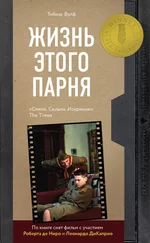Тобиас Вулф - The Liar
Здесь есть возможность читать онлайн «Тобиас Вулф - The Liar» весь текст электронной книги совершенно бесплатно (целиком полную версию без сокращений). В некоторых случаях можно слушать аудио, скачать через торрент в формате fb2 и присутствует краткое содержание. Жанр: Проза, на английском языке. Описание произведения, (предисловие) а так же отзывы посетителей доступны на портале библиотеки ЛибКат.
- Название:The Liar
- Автор:
- Жанр:
- Год:неизвестен
- ISBN:нет данных
- Рейтинг книги:3 / 5. Голосов: 1
-
Избранное:Добавить в избранное
- Отзывы:
-
Ваша оценка:
- 60
- 1
- 2
- 3
- 4
- 5
The Liar: краткое содержание, описание и аннотация
Предлагаем к чтению аннотацию, описание, краткое содержание или предисловие (зависит от того, что написал сам автор книги «The Liar»). Если вы не нашли необходимую информацию о книге — напишите в комментариях, мы постараемся отыскать её.
The Liar — читать онлайн бесплатно полную книгу (весь текст) целиком
Ниже представлен текст книги, разбитый по страницам. Система сохранения места последней прочитанной страницы, позволяет с удобством читать онлайн бесплатно книгу «The Liar», без необходимости каждый раз заново искать на чём Вы остановились. Поставьте закладку, и сможете в любой момент перейти на страницу, на которой закончили чтение.
Интервал:
Закладка:
Tobias Wolff
The Liar
My mother read everything except books. Advertisements on buses, entire menus as we ate, billboards; if it had no cover it interested her. So when she found a letter in my drawer that was not addressed to her she read it. “What difference does it make if James has nothing to hide?”— that was her thought. She stuffed the letter in the drawer when she finished it and walked from room to room in the big empty house, talking to herself. She took the letter out and read it again to get the facts straight. Then, without putting on her coat or locking the door, she went down the steps and headed for the church at the end of the street. No matter how angry and confused she might be, she always went to four o’clock Mass and now it was four o’clock.
It was a fine day, blue and cold and still, but Mother walked as though into a strong wind, bent forward at the waist with her feet hurrying behind in short, busy steps. My brother and sisters and I considered this walk of hers funny and we smirked at one another when she crossed in front of us to stir the fire or water a plant. We didn’t let her catch us at it. It would have puzzled her to think that there might be anything amusing about her. Her one concession to the fact of humor was an insincere, startling laugh. Strangers often stared at her.
While Mother waited for the priest, who was late, she prayed. She prayed in a familiar, orderly, firm way: first for her late husband, my father, then for her parents — also dead. She said a quick prayer for my father’s parents (just touching base; she had disliked them) and finally for her children in order of their ages, ending with me. Mother did not consider originality a virtue aiiu UHLU iiiy iiaiiic came up her prayers were exactly the same as on any other day.
But when she came to me she spoke up boldly. “I thought he wasn’t going to do it anymore. Murphy said he was cured. What am I supposed to do now?” There was reproach in her tone. Mother put great hope in her notion that I was cured. She regarded my cure as an answer to her prayers and by way of thanksgiving sent a lot of money to the Thomasite Indian Mission, money she had been saving for a trip to Rome. She felt cheated and she let her feelings be known. When the priest came in Mother slid back on the seat and followed the Mass with concentration. After communion she began to worry again and went straight home without stopping to talk to Frances, the woman who always cornered Mother after Mass to tell about the awful things done to her by Communists, devil-worshipers, and Rosicrucians. Frances watched her go with narrowed eyes.
Once in the house, Mother took the letter from my drawer and brought it into the kitchen. She held it over the stove with her fingernails, looking away so that she would not be drawn into it again, and set it on fire. When it began to burn her fingers she dropped it in the sink and watched it blacken and flutter and close upon itself like a fist. Then she washed it down the drain and called Dr. Murphy.
The letter was to my friend Ralphy in Arizona. He used to live across the street from us but he had moved. Most of the letter was about a tour we, the junior class, had taken of Alcatraz. That was all right. What got Mother was the last paragraph where I said that she had been coughing up blood and the doctors weren’t sure what was wrong with her, but that we were hoping for the best.
This wasn’t true. Mother took pride in her physical condition, considered herself a horse: “I’m a regular horse,” she would reply when people asked about her health. For several years now I had been saying unpleasant things that weren’t true and this habit of mine irked Mother greatly, enough to persuade her to send me to Dr. Murphy, in whose office I was sitting when she burned the letter. Dr. Murphy was our family physician and had no training in psychoanalysis but he took an interest in “things of the mind,” as he put it. He had treated me for appendicitis and tonsillitis and Mother thought that he could put the truth into me as easily as he took things out of me, a hope Dr. Murphy did not share. He was basically interested in getting me to understand what I did, and lately he had been moving toward the conclusion that I understood what I did as well as I ever would.
Dr. Murphy listened to Mother’s account of the letter, and what she had done with it. He was curious about the wording I had used and became irritated when Mother told him she had burned it. “The point is,” she said, “he was supposed to be cured and he’s not.”
“Margaret, I never said he was cured.”
“You certainly did. Why else would I have sent over a thousand dollars to the Thomasite Mission?”
“I said that he was responsible. That means that James knows what he’s doing, not that he’s going to stop doing it.”
“I’m sure you said he was cured.”
“Never. To say that someone is cured you have to know what health is. With this kind of thing that’s impossible. What do you mean by curing James, anyway?”
“You know.”
“Tell me anyway.”
“Getting him back to reality, what else?”
“Whose reality? Mine or yours?”
“Murphy, what are you talking about? James isn’t crazy, he’s a liar.”
“Well, you have a point there.”
“What am I going to do with him?”
“I don’t think there’s much you can do. Be patient.”
“I’ve been patient.”
“If I were you, Margaret, I wouldn’t make too much of this. James doesn’t steal, does he?”
“Of course not.”
“Or beat people up or talk back.”
“No.”
“Then you have a lot to be thankful for.”
“I don’t think I can take any more of it. That business about leukemia last summer. And now this.”
“Eventually he’ll outgrow it, I think.”
“Murphy, he’s sixteen years old. What if he doesn’t outgrow it? What if he just gets better at it?”
Finally Mother saw that she wasn’t going to get any satisfaction from Dr. Murphy, who kept reminding her of her blessings. She said something cutting to him and he said something pompous back and she hung up. Dr. Murphy stared at the receiver. “Hello,” he said, then replaced it on the cradle. He ran his hand over his head, a habit remaining from a time when he had hair. To show that he was a good sport he often joked about his baldness, but I had the feeling that he regretted it deeply. Looking at me across the desk, he must have wished that he hadn’t taken me on. Treating a friend’s child was like investing a friend’s money.
“I don’t have to tell you who that was.”
I nodded.
Dr. Murphy pushed his chair back and swiveled it around so he could look out the window behind him, which took up most of the wall. There were still a few sailboats out on the Bay, but they were all making for shore. A woolly gray fog had covered the bridge and was moving in fast. The water seemed calm from this far up, but when I looked closely I could see white flecks everywhere, so it must have been pretty choppy.
“I’m surprised at you,” he said. “Leaving something like that lying around for her to find. If you really have to do these things you could at least be kind and do them discreetly. It’s not easy for your mother, what with your father dead and all the others somewhere else.”
“I know. I didn’t mean for her to find it.”
“Well.” He tapped his pencil against his teeth. He was not convinced professionally, but personally he may have been. “I think you ought to go home now and straighten things out.”
“I guess I’d better.”
“Tell your mother I might stop by, either tonight or tomorrow. And, James — don’t underestimate her.”
While my father was alive we usually went to Yosemite for three or four days during the summer. My mother would drive and Father would point out places of interest, meadows where boom towns once stood, hanging trees, rivers that were said to flow upstream at certain times. Or he read to us; he had that grown-ups’ idea that children love Dickens and Sir Walter Scott. The four of us sat in the back seat with our faces composed, attentive, while our hands and feet pushed, pinched, stomped, goosed, prodded, dug, and kicked.
Читать дальшеИнтервал:
Закладка:
Похожие книги на «The Liar»
Представляем Вашему вниманию похожие книги на «The Liar» списком для выбора. Мы отобрали схожую по названию и смыслу литературу в надежде предоставить читателям больше вариантов отыскать новые, интересные, ещё непрочитанные произведения.
Обсуждение, отзывы о книге «The Liar» и просто собственные мнения читателей. Оставьте ваши комментарии, напишите, что Вы думаете о произведении, его смысле или главных героях. Укажите что конкретно понравилось, а что нет, и почему Вы так считаете.






